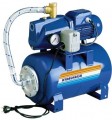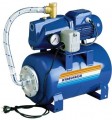Maximum head
The maximum head generated by the pump. This parameter is most often indicated in meters, by the height of the water column that the unit can create — in other words, by the height to which it can supply water. You can estimate the pressure created by the pump using a simple formula: every 10 m of head corresponds to a pressure of 1 bar.
It is worth choosing a pump according to this parameter, taking into account the height to which it should supply water, as well as adjusting for losses and the need for pressure in the water supply. To do this, it is necessary to determine the difference in height between the water level and the highest point of water intake, add another 10 to 30 m to this figure (depending on the pressure that needs to be obtained in the water supply), and multiply the result by 1.1 — this will be the minimum pressure required.
Ejector
The presence of an ejector in the design or delivery set of the pump.
The main purpose of the ejector is to increase the effective suction height. Its action is based on the fact that part of the water pumped by the pump is sent back down to the intake point; this water in some way "pushes" the water in the main suction line. Thanks to this, the suction height can be increased from 7-8 m, available without an ejector, to 15-20 m. The main disadvantage of this device is a rather high noise level.
Dry run protection
A system that protects the unit from running without water.
The dry running mode is abnormal for any pump: at best, the mechanism of the unit in this mode experiences increased loads, and at worst, the device may fail and even a serious accident. This feature allows you to prevent such consequences. The specific method of protection against dry running may be different; one of the most popular options is a float switch (see below). However, in addition, flow sensors, pressure or level switches can be used. These details depend both on the general type of pump and on the specific model; they should be specified separately in each case.
Maximum power
Rated power of the pump motor. The more powerful the engine, the higher the performance of the unit, usually, the greater the pressure, suction height, etc. Of course, these parameters largely depend on other features (primarily the pump type, see above); but models similar in design can be compared in terms of power.
Note that high power, usually, increases the size, weight and cost of the pump, and also implies high costs of electricity or fuel (see "Power source"). Therefore, it is worth choosing a pump according to this parameter taking into account the specific situation; more detailed recommendations can be found in special sources.

